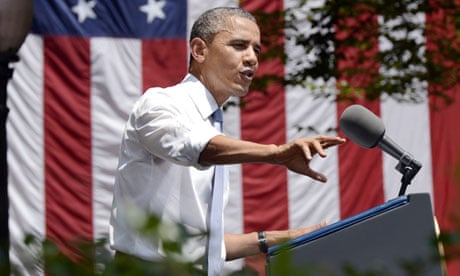When President Barack Obama gave his long-awaited climate change speech in June, many US environmentalists bought the notion that a green giant was awakening in the White House.
"Sticking your head in the sand might make you feel safer, but it's not going to protect you from the coming storm," Obama warned climate laggards then.
Here's a problem though. One environmental foot-dragger President Obama could have addressed this comment to is ... President Obama.
On Wednesday, the Council of the International Civil Aviation Organisation (Icao) is expected to approve a US-backed text that would restrict Europe's efforts to make airlines pay for their emissions under its carbon trading scheme, and stall global efforts to charge airlines for their pollution until 2016 or later.
In recent years, Europe has tried to make aviation pay under its emissions trading system (ETS), and with good reason.
Airlines are the fastest growing source of global greenhouse gas output. Already responsible for 5% of the world's annual global warming, by 2030 their emissions are projected to double from 2005 levels.
Yet last November, Obama signed a Congressional act authorising the US transport secretary to prevent US airlines from participating in the ETS.
It seemed an odd move for a president who supported the 'cap and trade' principle which underpins the scheme. The US has only rarely authorised such prohibitions, such as when Congress banned investment in apartheid South Africa, or outlawed compliance with Arab nations' boycott of Israel.
But the aviation situation is very different.
Only six countries emit more CO2 than the air industry does each year. Obama's act allowed the US to hide behind three of them – China, Russia and India – all playing political games at the Icao in the run-up to talks on a 2015 global climate deal.
Washington has finally emerged to push for Wednesday's text blocking any global carbon pricing mechanism until 2016 at the earliest. It also insisted that states and regional blocs only charge for emissions over their own land airspace – thus omitting the 78% of emissions that take place over water.
This formula underpins the thinking behind the expected Icao text, which restricts the ETS to emissions over European airspace.
It is no surprise that the US position seems to have won the day. Kicking the can down the runway has been the Icao's default setting since it was tasked with cutting emissions under the Kyoto protocol in 1997.
The EU has pledged to restart its aviation-charging scheme if Icao fails to come to an effective agreement, as now seems likely. Yet it will now have the threat of a trade war hanging over it if it does so, unless it restricts the carbon charges to EU airspace. It's an absurd situation, when you consider Obama's climate rhetoric.
Europe's politicians should baulk at the situation, but appear to have been cowed by lobbying from the aviation industry that the carbon charging scheme will result in economic costs for the continent. But if Europe allows the ETS to hollow into a husk that is unable to meaningfully reduce emissions, it will rightly spur calls for more radical action against the international aviation industry.
The dissonance between the US position on tackling emissions from aviation and Obama's language in June – "Convince those in power to reduce our carbon pollution. Push your own communities to adopt smarter practices. Invest! Divest!" – could hardly be greater.
The EU must stand firm and insist on actions, not words, to curb aviation emissions. US environmentalists must also move beyond 'greenest-president ever' soundbites and try to hold Obama to his rhetoric.
This, after all, is the president who said that office-holders such as himself "will need to be less concerned with the judgement of special interests and well-connected donors, and more concerned with the judgement of posterity." It's time Obama heeded his own advice.

